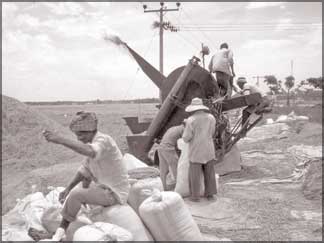Demographics and development
 Rahul Jacob of London’s Financial Times reported recently that while
Western clothing and footwear firms are moving production from China to
countries such as Indonesia, Vietnam and Bangladesh, they are not
relocating to India, the other big Asian economic powerhouse. Rahul Jacob of London’s Financial Times reported recently that while
Western clothing and footwear firms are moving production from China to
countries such as Indonesia, Vietnam and Bangladesh, they are not
relocating to India, the other big Asian economic powerhouse.
He attributes this geographic industrial shift towards the newest
‘Tiger Economies’ to demographics. In China, the rate of population
growth has been slowing and this has resulted in a labour shortage in
its Southern region, the hub of its industrial growth.
The labour shortage has compelled companies in labour-intensive
manufacturing, such as garments and shoes, to move their operations to
countries where cheap labour is available in abundance.
Labour shortage
The reason Jacob gives for not these operations not being transferred
to India is that country’s relatively low level of literacy,
particularly among women, who make up the bulk of employees in the
labour-intensive sector.
China is expected to deal with this movement - and with the chronic
labour shortage which caused it - by shifting its emphasis from
industries requiring semi-skilled and unskilled labour to higher
technology ones, which call for a skilled and educated workforce.
Educational level
It is well equipped for this change, since the number of young people
with secondary and higher education has been growing.
|

Community participation important for agricultural
activities. File photo |
What significance does this phenomenon have for the economic
development of Sri Lanka? Is this island a potential target for the
industries shifting out of China?
An examination of the country’s demographics shows that the
population growth rate has been slowing for some time. The 15-19 age
cohort is the largest, the following cohorts decreasing in size in
succession.
Given that unemployment, at 4.9 percent is at a historic low, and
given that the highest level of unemployment is in the 15-24 age
category, this means that there is likely to be a shortage of labour in
the future - especially since there is a very high rate of worker
migration overseas.
Unemployment among those with an education level of Grade 5 or below
is virtually non-existent at 0.7 percent. It increases with educational
level, from 3.6 percent for those with Grade 6-10 education, through 6.9
percent for those who have GCE (O-Level) to 11.6 percent for those with
A-Levels and above.
The level of unemployment for women is double that for men, both
overall and in each educational category. Even so, it is quite clear
that Sri Lanka’s labour market will not be attractive to labour-intensive
manufacturers looking to relocate out of China, since there is a labour
shortage in the less-educated categories.
Obviously Sri Lanka should be looking to exploit the greater
availability of higher-productivity educated workers.
Clerical work
This is already happening to a certain extent, with the outsourcing
industry building up rapidly. However, most of the jobs in this sector
rely on the use of English - not only for call centres, but also for
accounting, architecture, medical analysis and clerical work.
This highlights another problem facing our educated workforce as
regards the labour market - its learning is skewed along industrially
non-productive avenues.
Lack of English is just one example. The high numbers of people with
knowledge of such things as Buddhist Civilization, Geography and Art
means that they are unsuited for the current job market.
These subjects are of course essential for a well-rounded education.
However, they do not provide the skills necessary for the modern-day
cut-throat employment bazaar.
The educational reforms of the mid 1970s were intended to partially
remedy this already visible gap between education and the employment.
However, they probably did not go far enough.
Outdated attitudes
Educational reform is essential. However, not only will it take time
to formulate and implement, it will be decades hence before its effects
will be visible. Concrete action is required now. Steps need to be taken
to address another drawback in our educated workforce - its
disinclination for manual labour. Once people get through their
A-Levels, they feel entitled to a desk job - an outlook that gets even
more extreme with university education.
This has much to do with outdated attitudes of caste and rank - it is
recorded that the Kandyan aristocracy looked down on King Sri Wickrama
Rajasinghe because he worked in his own Kurakkan fields. Our society
still lacks the concept of dignity of labour.
Hence, to the government there falls an immediate, threefold task.
Firstly, it is necessary to impart to the educated workforce a new work
ethic.
Foreign markets
Secondly, it must enhance the skills of those currently educated but
unemployable, using their existing skills wherever possible. For
example, art students could be trained further to be graphic designers
or cartoonists. Thirdly, it actively must promote the industries which
require these skills, both among local entrepreneurs and in foreign
markets. The art students exemplified above could be employed in
outsourced advertising or animation work. Sri Lanka is poised on a cusp
in its development. It can continue as a cheap labour market, supplying
housemaids to richer countries and producing garments - in which case it
will stagnate in the long run.
Alternatively, it could position itself as the knowledge and skills
hub of Southern Asia, in which case it will be bound to develop by leaps
and bounds. However, this will require timely and dedicated action by
all concerned. |



